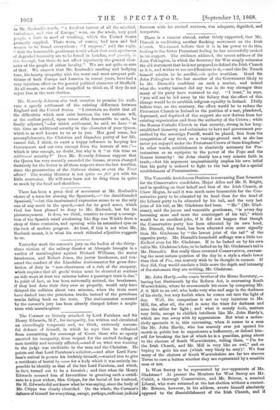There is a rumour abroad, rather thinly supported, that Mr.
Disraeli is meditating another flanking movement on the Irish Church. We cannot believe that it is in his power to do this, looking to the bitter Protestant feeling he has successfully evoked in his support. The evidence adduced, the recent address of Sir John Pakington, in which the Secretary for War simply reiterates the old statement that he is not prepared to defend the Irish Church as it is, and wishes to see modifications in it,—and this Dr. Trench himself admits to be needful,—is quite worthless. Good Sir John Pakington is the last member of the Government likely to be Mr. Disraeli's confidant on such a matter, and indeed what the worthy baronet did say was in its way stronger than many of his party have ventured to say. "I trust," he says, "you will not be led away by the fallacy that the effect of this change would be to establish religious equality in Ireland. I fully believe that, on the contrary, the effect would be to reduce the Protestant Church in Ireland to the position of a sect, plundered, depressed, and deprived of the support she now derives from her existing organization and from the authority of the Crown ; while the Roman Catholic Church in that country, strong in her long- established hierarchy and submissive to laws and government pre- scribed by the sovereign Pontiff, would be placed, free from the competition of any rival, on a vantage-ground such as she has never yet enjoyed under the Protestant Crown of these kingdoms." In other words, establishment is absolutely necessary for Pro- testantism as an equipoise to the power of the Pope and the Roman hierarchy ! Sir John clearly has a very minute faith in truth,—but his argument unquestionably implies his own belief that his party is ordered to fight to the last gasp for a special establishment of Protestantism.






























 Previous page
Previous page